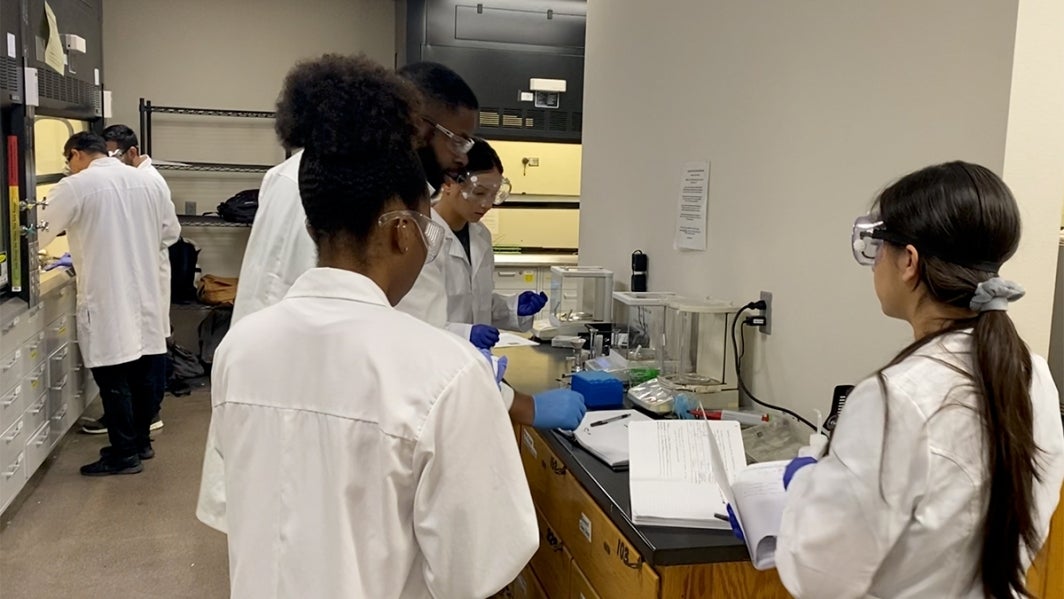This summer, Arizona State University's School of Molecular Sciences provided in-person instruction to a record number of 540 enrolled online students, who took laboratory courses in organic chemistry, biochemistry and analytical chemistry in a specially designed, condensed and immersive format.
These courses give students the hands-on experience with laboratory equipment and procedures they need for their careers.
“I am applying to medical schools, and one of the first things they ask me is whether I have research experience and have been in a lab and done my own experiments,” said Febronya Oraha, a pre-medical student.
Biomedical sciences major Erica Williams echoed that sentiment.
“Medical schools and graduate schools want to see hands-on lab experience, so this program will strengthen my applications,” she said.
“We started these labs in 2018 with two courses and around 50 students, but we knew even then that the challenge would be whether we could successfully scale the programs,” said Ian Gould, School of Molecular Sciences professor and associate dean of online and digital innovation in the school. “We now have six courses, serve 10 times as many students, and we are looking forward to next summer, which will be even bigger.”
In addition to the original General Organic Chemistry Lab courses, the offerings now include Elementary Organic Chemistry Lab, Elementary Biochemistry Lab, Analytical Biochemistry Lab and Analytical Chemistry Lab. Together with a new Elementary Physical Chemistry Lab course that allows students remote control operation of instrumentation and experiments, online students now have access to a wide range of hands-on chemistry and biochemistry experiences.
Students traveled to the Tempe campus from around the country, with some students who are serving in the military traveling from east Asia, and the program's first international student arriving from central Asia.
Many students were also part of ASU’s corporate partnership programs, including Starbucks, LabCorp and Uber.
The labs serve students from a wide range of disciplines, including molecular science, biological sciences, forensic science, justice studies, business and psychology.
This summer, ASU's School of Molecular Sciences provided in-person instruction to a record number of 540 enrolled online students, who took laboratory courses in organic chemistry, biochemistry and analytical chemistry in a specially designed, condensed and immersive format. Photo courtesy School of Molecular Sciences
Students seeking online degrees often work full time and need to use vacation time to attend; however, most agree the in-person experience is worth the time and expense.
“The condensed lab format has been both hectic and enjoyable,” said Michael Mazzitello, a supervisor at a nuclear power plant in Minnesota. “Coming here was an investment, but it is well worth it. My experience will allow me to meld theoretical knowledge to practical experience and learning. I will apply what I’ve learned here to my job.”
“The labs allow me to apply what we’ve learned online in actual practice," said Stephanie Sutton, a biochemistry student from Anaheim, California, and a Starbucks scholar. "You can’t be a scientist without doing scientific experiments.”
In addition to the lab experience, the online students say they also enjoy the benefits of meeting and networking with their peers and ASU faculty, who up until then they knew only virtually.
“I’ve had a blast since I’ve been here; I’ve connected with so many people. It’s really cool to see my professors in person as well,” biochemistry major Noah Hogan said.
MORE: ASU Online students' startup organization grows to become one of largest university clubs
“I enjoyed interacting with such a diverse group of students during the summer labs this year," said Orenda Griffin, manager of online programs in the School of Molecular Sciences. "Assisting students with this unique opportunity to live out their dreams of becoming a scientist is so rewarding. Observing students make their Sun Devil experience real and meaningful while here on campus is truly a privilege.
"The nontraditional approach of allowing online students to conduct experiments in person is one of the foremost reasons I love managing the online programs in the School of Molecular Sciences.”
Bryan Lozada, from Gilbert, Arizona, says he is looking forward to a career in pharmacology.
“Almost everything I’m doing here, whether using a micropipette or other lab equipment, and learning how to conduct myself safely and professionally in a lab, is something I will need in my career. I work full time, and I would not have been able to graduate without ASU Online,” he said.
See more photos from the summer lab and learn more about school's online programs.
Get to know past online students and learn about their experience in the video below:
Top photo: Undergraduate students Sadie Grossman (left) and Leah Hendley in the Organic Chemistry lab course, summer 2022. Photo courtesy Mary Zhu/SMS
More Science and technology

ASU-led space telescope is ready to fly
The Star Planet Activity Research CubeSat, or SPARCS, a small space telescope that will monitor the flares and sunspot activity of low-mass stars, has now passed its pre-shipment review by NASA.…

ASU at the heart of the state's revitalized microelectronics industry
A stronger local economy, more reliable technology, and a future where our computers and devices do the impossible: that’s the transformation ASU is driving through its microelectronics research…

Breakthrough copper alloy achieves unprecedented high-temperature performance
A team of researchers from Arizona State University, the U.S. Army Research Laboratory, Lehigh University and Louisiana State University has developed a groundbreaking high-temperature copper alloy…



